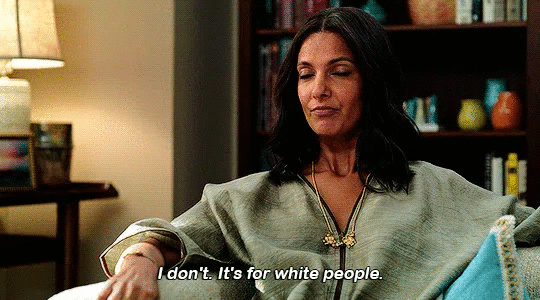Effectiveness
How effective is Never Have I Ever in promoting better representation?
I believe that Never Have I Ever is a promising step towards greater representation. Its efforts to amplify minority voices do have limitations though. As the show tries to reverse negative stereotypes, it simultaneously perpetuates others to appeal to a broader audience.

Ben poses by his birthday cake inside of his family's luxurious mansion, epitomizing the stereotype of wealthy Jews.
For example, the producers make Nalini a single, working mother to combat images of South Asian women in domestic roles. At the same time, she feeds into other stereotypes about Indians, such as the strict, closed-off mother. Nevertheless, maybe the writers made these choices to expose those problematic views. Since Nalini adopts the stereotypical mindset of internalizing her grief, she strains her relationship with Devi and cannot find closure.

The show stereotypes Nalini through her reluctance to see a therapist. (GIF via Tumblr)
Kamala presents a similar duality. One one hand, she dispels stereotypes about arranged marriages because she likes her match more than the man she had secretly dated. On the other hand, her character prolongs associating such arrangements with South Asians. Tropes to make the series more palatable for American audiences—such as Kamala’s heavy accent and taking love advice from Riverdale—also misrepresent Indians.

"Oh Betty. How brave you are to stand up to your parents," Kamala comments while watching Riverdale.
Finally, the show fails to develop other minority characters. Take Devi’s half-Japanese crush Paxton and gay classmate Jonah. Instead of exploring their race and sexuality, the series uses them to mainstream diversity and write punchlines. Likewise, Jewish nemesis Ben is stereotyped as a rich overachiever for comic relief. These lows left me wishing for more depth in season two, so that these groups may get the representation they deserve.

Conclusion
Overall, I applaud Never Have I Ever for more accurately representing South Asians, even though the execution is imperfect. Some viewers expect Kaling to do more, given that she is the first Indian-American woman to break the comedy glass ceiling: speak for an entire ethnic group. Captivate global audiences without mainstreaming cultures. But I think it’s unfair to assume that Kaling can carry that burden of representation alone because the entertainment industry’s demands limit her from delivering the narratives we hope to see. Thus, we must share our own stories. Shatter those ceilings. And encourage others to do the same.